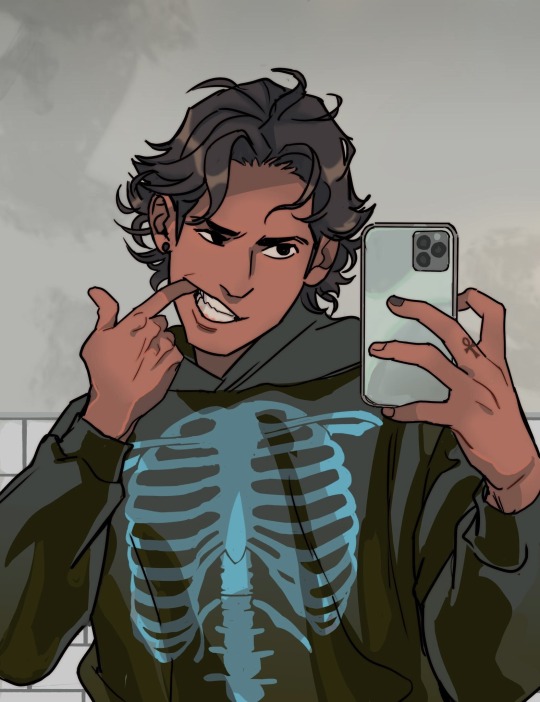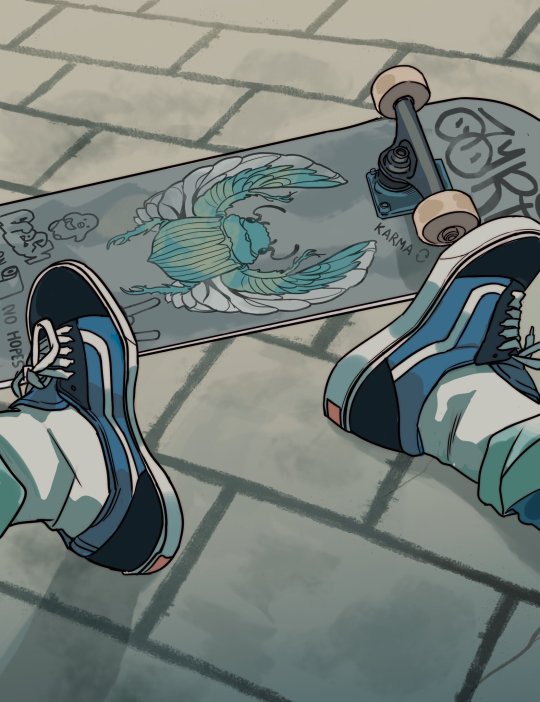Text

Heya, Ready to get into the Halloween spirit while working on your creative projects? I've got 5 fun ways to set the perfect mood!! From eerie podcasts to themed breaks, let’s get some inspiration this spooky season! Here are the contents of the post:
Spooky Podcasts
Audiobooks for Creepy Inspiration
Halloween Music Playlists
Themed Breaks
Halloween-Themed Games
Read here!
14 notes
·
View notes
Text

Ever felt guilty after a gaming session? You’re not alone ;o; In my new blog post, all about how to remove the guilt that comes after a good gaming session, i talk about the following:
Understanding guilt
Why do we feel guilty about gaming?
Combating the stigma around gaming
The Benefits of Gaming
Cognitive benefits
Social benefits
Mental health benefits
Physical health benefits
How to game responsibly
Creating a Guilt-Free Gaming Mindset
CLICK HERE TO READ
Share this if you find my information useful! <3
29 notes
·
View notes
Photo

6K notes
·
View notes
Text
Reducing verbosity, improving clarity
Part 3/3 of my editing process. Part 1 link. Part 2 link.
This is what I do to a novel or a novella before showing it to anyone (including beta readers). I’m posting it in hopes that it will help someone, and I’m not expecting it to work for everyone. Take any parts that help you!
The goal of this step is to make the style more crisp and direct. If you're going for a slow or very poetic style, this may not be as applicable.
Two things up front:
‘Imperfect’ doesn’t mean ‘bad’. Good writing can have imperfections.
The goal is to get the manuscript to a stage where the imperfections won’t be distracting to beta readers.
The idea is to convey the maximum amount of meaning in the minimum number of words. Be as specific as you can.
Large paragraphs
I go over the manuscript and compare the size of paragraphs. If they look close to square on a laptop screen, I’ll see what I can do about them. I personally don’t mind a paragraph of description or exposition, but the one rule I adhere to is that it must be immediately connected to what the character is thinking, feeling, or talking about.
E.g. I need to give a description of the uniform most of my characters wear.
‘So he sat there in the ashen coatee with white facings, unbuttoned to reveal a white waistcoat, both creased after a long day. Little swords on his shoulder straps signified his division, and three stripes on the buttons of his jacket marked him as a sergeant. His long slim Sword was at his side — not as slim as a rapier, and with only a simple cross-guard over the grip. And yes, it looked more silvery than cold iron should, and it glowed faintly in the dark, but when it was sheathed, it looked very ordinary. I’m just a simple Sword, Ianim’s appearance said. Move along; there’s nothing interesting about me.’ → I deliberately highlight the details about the weapon that are out of ordinary, AND explain how Ianim feels about the outfit.
If it doesn’t do that at the end, and is still long, it needs to be shortened or tied into the current situation.
Laundry list of actions
Here, I’m looking for paragraphs that list a handful of actions, without any introspection or description. It usually means I’m spelling out every little action, when the reader will fill in the blanks easily if I remove a good portion of them. It’s things like ‘looked around and located X’ or ‘walked across the room’.
E.g. ‘He rolled his eyes around, trying to locate whoever was speaking. He felt a faint touch on his left shoulder and twitched, promptly hissing in pain. The hand was withdrawn. He gathered his strength and turned his head in that direction.’ → I don’t lose anything by cutting the first sentence. In fact, it works better without a convoluted description of looking around.
Too many clauses
Another kind of sentence that I come across in my drafts is of the form ‘Something was X and Y happened to it’, which can be rephrased as a single clause.
E.g. ‘The roof had collapsed in one corner, and water dripped through it.’ → ‘Water dripped through a hole in the corner of the roof.’
E.g. ‘Once Master Varré had returned and deposited the supplies in the kitchen, the four of them sat down to a simple meal.’ → ‘Once Master Varré had deposited the supplies in the kitchen…’
Reiterating spoken words with actions
I want my dialogue and action tags to add something new to what’s said, not reiterate it. I look for actions like ‘sighed’, ‘frowned’, ‘nodded’, ‘shook their head’. I’m NOT advocating for removing all of them by any means. They’re sometimes needed to induce a pause in dialogue, and are slightly better than saying ‘he paused’. Quite often, an ellipsis will work just as well.
Examples of reiterating dialogue:
“It’s taught in the second year of the cadet course, but…” He frowned. “I don’t see why not? → remove ‘He frowned’
Gullin nodded sharply. “Yes, ma’am.” → the line of dialogue can be cut.
“I can’t deny it. It is regrettable, but I don’t think I can deny it.” He sighed. “I wish it wasn’t the case though.” → remove the dialogue tag. Yes, when I read this sentence, I instinctively hear a sigh there, but nothing hinges on it being there, and removing it doesn’t mess up the rhythm.
“Do you not want to take it outside, sir?” Gullin checked. Master Varré thought about it, but shook their head. “Not necessary. We are not going to release our Swords.” → remove ‘not necessary’
Dialogue thing that I do
On a similar dialogue-related note: as I write I ‘hear’ the words spoken in the character’s voice in my head. As a result, I VERY often end up with dialogue, where the action in the tag is performed by a character other than the one who’s speaking – usually to indicate a pause or a non-verbal reaction.
E.g.
Master Varré sprang out of their chair and started pacing around the hall. Lissan watched them warily.
“We need evidence, solid evidence before we can mention this to anyone. No offence, kid, but your word won’t cut it.” Lissan nodded seriously; he’d expected nothing less. “I’m going to Redguard to check [their] records.”
→ This is spoken by Varré, not Lissan, though the action tag indicates something to the contrary. I need to add something like ‘they said’ to clarify it.
Another dialogue thing that I do
A couple of my characters deliberately hide their emotions, and their reactions are measured. I tend to indicate it with phrases like ‘he allowed himself a sigh of relief’ or ‘he permitted himself a small smile’. Now, I want to bring it to the reader’s attention, when the character’s control is important in the scene – e.g. they’re keeping their cool during an argument, and allowing themselves a small smug smile when they come out on top. However, it’s not adding anything when their self-control doesn’t contribute to the conversation – which is most of the time. Even then, not every controlled reaction has to be preceded by a phrase like this; a few mentions are enough to establish the background tension, but soon it gets repetitive.
Hence, I’ll remove it:
Every time – in conversations where the characters can relax, e.g. when talking to their buddies at a pub.
Most of the time when the character’s self-control is important. I’d leave it in no more than half of the gestures (smiling, sighing, rolling shoulders, rubbing their eyes, etc.).
Thesaurusising/rephrasing
Especially in narration and in longer paragraphs, I find sentences of the form ‘they tended/liked/had a talent for doing X and Y’, where X and Y are close in meaning. I can remove one of them or replace them with a more generic word that covers both.
‘She had an incredible talent for reading hints between the lines and figuring out what was not said’ → Yes, that’s exactly what reading between the lines means. I’m removing the second clause.
Sometimes, especially in dialogue, I leave the rephrasing for dramatic effect, but only when I’m confident that it adds something.
E.g. “Because ever since I’ve met him, he wanted to be seen not as the Prince Successor, not as a grandson of the White Dragon, but a normal guy.” → this stays as is.
Describing the obvious
There’s usually no reason to describe something that the reader can reasonably assume to be the case. E.g. if you say it’s raining, you don’t need to follow it up by saying the clouds covered the sky.
UNLESS
The few exceptions I can think of:
One of my characters focuses on their surroundings to avoid doing something. E.g. they aren’t in a mood to talk and they let a conversation happen around them without listening, they focus on the chips in the walls or the grain of wood on the table.
When a character is bored or waiting for something, they might look around their surroundings. Adding descriptions to pass the time is often a good alternative to saying ‘they waited’.
When the ‘homely’ is surprising. E.g. the character has been on a run for a while, squatting in abandoned buildings or sleeping outdoors. When they finally get home, I’d elaborate on the comfort of it, to pull the reader out of the default atmosphere of the last few chapters.
I still consider these tricks to be exceptions to the rules – best used sparingly.
27 notes
·
View notes
Text
Narrative Botox: Filler Words and Phrases to Look Out For

If you’re planning on publishing traditionally, chances are you keep a sharp eye on your word count. Literary agents and publishing houses are on the hunt for the best quality stories that they can print for the cheapest price (using the least paper and ink), so you have a higher chance of gaining representation if you can crank your novel out in the least words possible.
However, filler words and phrases aren’t only the enemies of aspiring traditional authors; every writer—fanfic, novelist, journalist, you name it!—should try to eliminate filler from their stories to assure more concise and high-quality writing. Oftentimes, filler contributes nothing but clutter, and without it, your narrative can flow smoother and in a more sophisticated manner.
But how do you know what’s filler and what’s not? Here are some tips on how to Ctrl+F and kick this narrative botox to the curb!
I compiled these lists with the help of Infusionmedia, BDR Publishing, and ResetEra !
Filler Words

1. Just
A writer’s worst enemy, and the bane of my manuscripts’ existences. Eliminating all the ‘just’s can cut down your word count by hundreds.
2. “That” as a conjunction
It’s an unnecessary addition to a sentence, which will be more streamlined without it.
Example: “He said that he wouldn’t do it again.”
Revised: “He said he wouldn’t do it again.”
3. “Now” as an adverb
“Now” is essential if you’re talking about the past and present, but when you’re using it to draw attention to a particular statement or point.
Example: “Now, I didn’t think it’d get so out of hand.”
Revised: “I didn’t think it’d get so out of hand.”
4. Redundant adverbs
These adverbs serve no purpose because the verbs they’re describing already imply the way the action is performed.
Whispering softly
Yelling loudly
Crying sadly
Laughing happily
5. “Telling” words
These words are redundant, especially when using first person, because in describing an event, we can already assume that the characters are experiencing it.
Seeing/saw
Feeling/felt
Hearing/heard
Smelling/smelled
6. “Clarifying” words used to portray definiteness or indefiniteness
Although these are meant to help out the readers get their bearings on a situation, all they do is come across as wishy-washy! Be concise and sure of yourself!
About
Absolutely
Accordingly
Actually
Almost
Basically
Certainly
Clearly
Completely
Entirely
Even
Exactly
Fairly
Highly
Hopefully
Literally
Maybe
Only
Often
Oftentimes
Perhaps
Possibly
Probably
Quite
Rather
Really
Reasonably
Relatively
Seem
Seriously
Simply
Slightly
Some
Somehow
Sometimes
Totally
Very
Filler Phrases

1.“Let out (vocal noise)”
Use the verb instead!
Example: “He let out a sigh.”
Revised: “He sighed.”
2. Using passive voice
Passive voice inflates your word count by including various “to be” verbs into the prose. Passive voice involves actions happening to a subject rather than the subject performing an action, and as a result isn’t as riveting to the reader as active voice; even if it wasn’t a matter of word count, you’d still want to get rid of it anyway!
Still don’t know what I’m talking about? Check out this article from Grammarly.
Example: “The boy was bitten by the dog on his arm.”
Revised: “The dog bit the boy on his arm.”
3. Describing the wrong noun
Many writers will be as specific as possible about what “thing” is affected by the event they’re describing, when it’s much simpler to take a step back and write about something more general.
Example: “The level of water rose.”
Revised: “The water rose.”
4. Phrasal verbs
Phrasal verbs are the combination of two or three words from different grammatical categories—a verb and an adverb or a preposition—to form a single action. Usually, these phrasal verbs can be replaced by a single-word verb.
“Ask for” can be replaced with “request”
“Bring down” can be replaced with “reduce”
“Come across” can be replaced with “find”
Etc.
5. Clarifying phrases
Same reason as clarifying words. Get to the point!
A bit
A little
A lot
In a sense
Kind of
Sort of
6. Remember your contractions!
Even if your story takes place in olden times, I can guarantee that if you never use any contractions ever, your story’s gonna be a clunky mess. But sometimes you’re in the moment, consumed by the poetic power of the muses, and forget that this isn’t a soap opera; so make sure you check that you’ve been using your contractions!
It is, it was, it would, she is, would not, should not, is not, does not etc.
7. Inflated phrases
These phrases can be replaced with more concise words.
Along the lines of (shorten to: like)
As a matter of fact (in fact)
As to whether (whether)
At all times (always)
At the present (now or currently)
At this point in time (now or currently)
Be able to/would(n’t) be able to (could or couldn’t)
Because of the fact that (because)
By means of (by)
Due to the fact that (because)
Even though (though or although)
For the purpose of (for)
For the reason that (because)
Have the ability to (could)
In light of the fact that (because)
In order to (to)
In regards to (on or about)
In spite of the fact that (though or although)
In the event that (if)
In the nature of (like)
In the neighborhood of (about)
On the occasion of (when)
On one/two separate occasions (Once/twice)
The/A majority of (most)
There is no doubt that (No doubt)
Wasn(n’t) capable of (could or couldn’t)
Hope this helped, and happy writing!
21K notes
·
View notes
Text
Good Traits Gone Bad
Exploring good traits gone bad in a novel can add depth and complexity to your characters. Here are a few examples of good traits that can take a negative turn:
1. Empathy turning into manipulation: A character with a strong sense of empathy may use it to manipulate others' emotions and gain an advantage.
2. Confidence becoming arrogance: Excessive confidence can lead to arrogance, where a character belittles others and dismisses their opinions.
3. Ambition turning into obsession: A character's ambition can transform into an unhealthy obsession, causing them to prioritize success at any cost, including sacrificing relationships and moral values.
4. Loyalty becoming blind devotion: Initially loyal, a character may become blindly devoted to a cause or person, disregarding their own well-being and critical thinking.
5. Courage turning into recklessness: A character's courage can morph into reckless behavior, endangering themselves and others due to an overestimation of their abilities.
6. Determination becoming stubbornness: Excessive determination can lead to stubbornness, where a character refuses to consider alternative perspectives or change their course of action, even when it's detrimental.
7. Optimism becoming naivety: Unwavering optimism can transform into naivety, causing a character to overlook dangers or be easily deceived.
8. Protectiveness turning into possessiveness: A character's protective nature can evolve into possessiveness, where they become overly controlling and jealous in relationships.
9. Altruism becoming self-neglect: A character's selflessness may lead to neglecting their own needs and well-being, to the point of self-sacrifice and burnout.
10. Honesty becoming brutal bluntness: A character's commitment to honesty can turn into brutal bluntness, hurting others with harsh and tactless remarks.
These examples demonstrate how even admirable traits can have negative consequences when taken to extremes or used improperly. By exploring the complexities of these traits, you can create compelling and multi-dimensional characters in your novel.
Happy writing!
56K notes
·
View notes
Text
Free Websites / Tools that I use for Writing ! !
Organizational:
Notion : a personal favourite of mine. from what i've seen, unlimited projects with a variety of cards to use. it also has an mobile app with it. highly recommend.
Milanote : has some limitations on how many cards you can have but has different templates you can tinker around with. is more of a whiteboard type of site.
Hiveword : i haven't used it but it provides a novel-building template for plot, scenes, characters, etc.
Lucidchart : another i don't use but from what I've seen, it's similar to Milanote with their whiteboard style. also has a variety of templates of charts, diagrams, and more!
Helpful Tools:
OneLook Thesaurus : my go-to website for finding synonyms. also provides definitions!
Language Tool : a chrome extension similar to Grammarly that acts as a grammar-aid tool.
Character Creation / World Building:
Pinterest : a great source if you're searching for inspiration. you can also find tips and prompts on the site too!
Reedsy Character Name Generator : a name generator that include forename and surnames. has nationality specific names and a few mythic / fantasy name generators.
Fantasy Name Generator : this name generator has much more variety with character names and fictional location titles.
Inkarnate : a fantasy world-building site that I used in the past. fun fact: i made a little (it wasn't little) dragon shaped island for one story that never made it on paper.
3K notes
·
View notes
Text
Writing advice that changed my sentence
When I was a young writer, I was told that I often started my sentences with "there is/there was/there are." I was told to eliminate those as much as possible.
I couldn't believe how often I used them. My first novel was completely littered with them.
I learned to diversify and grow my use of verbs. Instead of the state-of-being verbs, like "is" which isn't very descriptive at all, I started using stronger verbs.
Instead of writing "There were a bunch of trees on the hill" I wrote "A cluster of trees towered over the hill."
"Towered" is a much stronger verb than "Is"
Use the state-of-being words, but if you can, try replacing them with more active verbs. You might be surprised how much your writing improves.
12K notes
·
View notes
Text
How to Format Your Finished Manuscript
as written by a perpetually flabbergasted editor
Congratulations, you’ve finished a manuscript! That monumental achievement alone deserves a reward. Please get yourself something delicious—don’t worry, I can wait.
Back? Awesome, because it’s time to talk about an important step of the prepublishing and/or pre-editing process, and that is how to format your manuscript.
When you’re writing your manuscript, it’s likely you have a unique setup. Fancy fonts, different text and document background colors, your preferred way of formatting the document—all elements work together to create a comfortable writing space where you can be your most creative.
As both a writer and editor, I have no problems with writers going wild with their documents’ technical aspects while they’re drafting—I do exactly the same thing when drafting. But when it comes time to share your project with other people—especially professionals in the publishing world—your snazzy setup is no longer going to be a benefit. I could share horror stories relating to document setup, from thousands of spaces used instead of the tab key to wacky file conversion issues.
Please don’t make your editor’s job any harder than it needs to be. Fancy formatting looks great, but it can be a nightmare to undo and wastes time that your editor could otherwise spend polishing the words themselves rather than what’s around them. It’s also significantly easier to work with a document that adheres to a standard format because it’s easier to catch mistakes that way—the editor isn’t distracted trying to wrangle extra spaces and text appearing in other languages.
Most publishing houses have what are called submission guidelines. Read them. Follow them. There’s little chance your manuscript is exempt from the rules, and believe me when I say authors who flaunt the guidelines don’t win the respect of the people who are working on their manuscripts.
If the publisher/editing service you’re submitting to doesn’t have obvious guidelines, first ask about them. They might have preferences. If not, as follows are some basic standard practices in North American publishing.
First off, if you can’t bear to give up your fancy writing setup, create a new copy of your document specifically for editing/submitting. Clearly label it as such. Make sure you implement any changes to this for-editing/submitting document, not just your fancy original.
Page and text setup:
Remove any document background images/page colors.
Change the entire document’s font to Times New Roman point 12. Make it black. Not dark gray, not dark brown—black.
Set the margins to one inch on all sides. This is Microsoft Word’s default document format, but not enough submitted manuscripts use it. Remember: layout for publishing comes after editing, not before. Editors are liable to completely change your document’s pretty formatting to industry standards anyway.
Set the document’s orientation to portrait, not landscape.
Center all section and chapter titles (e.g., Table of Contents, Chapter 1, Acknowledgements, About the Author, etc.).
Remove all double spaces from the file. Seriously. This is an incredibly easy step. Do not make your overworked, underpaid editor do this incredibly trivial and time-consuming task for you. Especially if you are using double spaces to indent or center content. If you, for some reason, are using the space bar to indent or center content, please stop what you are doing and follow these steps:
Use your word processor’s “center text” function. In programs like Word, this can be done by hitting Control + E. (Ctrl + L and Ctrl + R, respectively, align text left and right.) Do not justify your text unless the guidelines demand it.
Use the tab key to indent paragraphs.
But bear in mind that sometimes this can result in a “tab” character existing at the beginning of a paragraph. This is bad. Preferably, set the entire document to a 0.5-inch indent and delete all tab characters.
Seriously, though, you should be searching every document before you send it out or copy it to an online format for double spaces. Make this a good habit, and you’ll ensure you set yourself apart as a cut above the other writers out there.
Set the entire document’s line spacing to double.
Front matter, chapters, and back matter should be separated by page breaks, not by a series of blank lines.
If you really want to delight your editor or anyone else who needs to work on your manuscript, consider removing all leading and trailing spaces from the document (link embedded).
Style elements:
Run spell check. This sounds obvious, but trust me, I’ve received manuscripts riddled with obvious spelling errors. If you write with spell check off for one reason or another, turn it back on when you’re getting ready to send a document out. Make a full pass on the document, and pay attention to every instance of that red squiggle.
Make sure you’re spelling the names of your characters and places consistently. I’ve seen Matt become Mike in the next paragraph, and Donilo become Donillo. Editors’ trust in the author’s abilities to do anything with competence drop drastically when we find these kinds of careless errors.
Similarly, either use the American spellings or the British spellings. Be consistent.
Separate your scenes with fleuron breaks. Three centered asterisks (***) used without spaces is the most common method of creating a fleuron break and the one I recommend using, although sometimes three number signs/hashes (###) can be acceptable. Do not use fancy symbols or symbols created through special fonts. They will not carry through if your editor changes your entire document to Times New Roman.
Optional change: remove the indent from the first paragraph in a chapter or after a scene break.
Make a point of using punctuation consistently. If you’re going to use the oxford comma, use it every time. Use a single dash consistently. Punctuate dialogue properly.
Improperly punctuated dialogue is one of the most common errors editors fix. There are only a few basic rules, covered here (link embedded), so please make an effort to learn and use them.
Use paragraphs properly. New speaker = new paragraph. New subject = new paragraph.
Once again, if you really want to delight your editor, change all hyphens between number ranges to en dashes. 3-5 days will become 3–5 days.
Correctly title your document. The title isn’t somehow going to magically change from StupidProject.docx or afhuowjfoa;wijef.docx to TheHungerGames.docx between your submitting it and other people reading the title.
If possible, use the .docx file format.
I want to wrap this up by saying that yes, editors are here to catch the mistakes you’ve missed, and we invariably have obscure technical knowledge that most writers don’t know exists (in Greek, the question mark is represented by a semicolon), but it’s your job as the writer to put your best effort forward. Also bear in mind that not all editors get paid to handle formatting issues but are expected to resolve them anyway. Fixing these basic issues yourself or, better yet, not creating them at all will help both you and your editor(s) ensure the version of the book you put out is the best possible version.
2K notes
·
View notes
Text
Ctrl+F'ing the Document
Part 2/3 of my editing process. Part 1 link.
This is what I do to a novel or a novella before showing it to anyone (including beta readers). I’m posting it in hopes that it will help someone, and I’m not expecting it to work for everyone. Take any parts that help you!
The goal of this step is to reduce word count by removing redundant and filtering words, and make the text more crisp and direct.
Two things up front:
‘Imperfect’ doesn’t mean ‘bad’. Good writing can have imperfections.
The goal is to get the manuscript to a stage where the imperfections won’t be distracting to beta readers.
Remove filtering and padding words
(With examples from my current editing pass of Gifts of Fate)
Search the manuscript – literally, with ctrl+F – for the following words. Try to remove especially those outside of dialogue. I allow more padding in dialogue to help differentiate character voices.
Most of these words can be removed within the context of the single sentence, maybe with a glance at the previous or the next one, for repetitions.
Suddenly – can be removed in 99% of the cases. In 109k words of GoF, I’m left with 5 occurrences, 3 of which are in dialogue. E.g. ‘He laughed suddenly.’ → ‘He burst out laughing.’
Then – as above. E.g. ‘He blushed then and looked to the side.’ → straight up remove ‘then’. What do you add to the sentence, little word?
‘In order to’ – can almost always be replaced with just ‘to’, but see a note below on using ‘to’ to indicate intent.
‘At that’, ‘at him’ in phrases like ‘was surprised by that’, ‘smiled at him’. E.g. ‘Ianim smiled at him with a mischievous twinkle in his eyes.’ → Just remove ‘at him’
Something – can usually be replaced with 1-2 more specific words, which will pack a sentence with more information. E.g. ‘It was something he could trust, and so he did.’ → ‘It was an instinct he could trust, and so he did.’
And on that note…
Turn intent into action
Don’t tell me what the character’s immediate plan is; show them doing it. This makes the action more direct, since we spend less time in the character’s head, and more watching the events unfold.
The first words to search for here are: could, would, should.
E.g. second pass of the last example: ‘It was an instinct he could trust, and so he did.’ → ‘It was an instinct he trusted.’
E.g. 'He could understand where they were coming from' → 'He understood where…'
I’m not that aggressive with removing the latter two.
Similarly ‘to’. Searching for it with ctrl+F produces a lot of false positives, but the instances I’m looking for are ‘they did X in order to do Y’.
E.g. ‘She slowly reached out her hand to touch the blade.’ → ‘She reached out slowly and touched the blade with a shaking hand.’
E.g. ‘The animals began to scuttle away.’ → ‘The animals scuttled away.’
E.g. ‘He sat straddling the bench to look directly at Lissan.’ → ‘... and looked …’
Yes, the meaning changes a tiny bit, but is the distinction crucial? In my case, the answer is almost always: it’s not.
Other padding words, often included in writing advice, are ‘that’, ‘almost’, ‘still, ‘quite’, and ‘very’, and again, they can be either removed or replaced with a stronger/weaker word.
E.g. ‘The wall to the right was almost entirely covered by a detailed map of the Five Princedoms.’ → ‘The wall to the right was covered by a detailed map of the Five Princedoms.’
E.g. ‘It even glowed very faintly in the dark.’ → just remove ‘very’.
Filtering words
Heard, smelled, felt, saw – they’re the filtering words, ok, but what does that mean? They distance the reader from the events, like observing them through a window. They also shift the focus from the events, onto the characters – so yes, I’d leave the words in when I want to stress that the character managed to see/hear something, despite it pushing the limits on their senses, but in most cases, they can go.
Each one of them is a little different, and I’ll order them from the most straightforward to most nuanced.
‘Heard’ is probably the easiest, and the only times I’d leave it in is when someone is eavesdropping (with description of how clearly they can hear a conversation) or to highlight that someone has exceptional hearing (with a note on the distance). Other than that, remove. E.g. ‘He heard his own voice falter.’ → ‘His voice faltered.’
‘Smelled’ – I try to remove it in sentences of the form ‘they smelled apple pies’, not ‘the apple pies smelled delicious.’ I’m also less aggressive about this one, and again leave it when it highlights someone’s super-senses. And! I never remove it at the cost of not describing a smell – include all senses. E.g. ‘Lissan smelled a rejuvenating, not quite minty aroma.’ → ‘A rejuvenating, not quite minty aroma drifted towards Lissan.’
‘Felt’ – there are at least two reasons why I’d want to remove it. First is that it’s telling emotions, in sentences like ‘He felt embarrassed.’ and I’ll get to these in the next part. The second thing is strictly filtering, describing what a character noticed about the environment. E.g. ‘It was black and it felt oily.’ → ‘It was black and oily, leaving unpleasant smudges on his fingers.’ E.g. ‘He felt a gust of wind at the back of his head.’ → ‘A gust of wind ruffled the hair at the back of his head.’
‘Saw’ – again, there are two ways in which I see this word pop up in my draft, which I want to cut down on. One is describing the action of watching, noticing, or spotting, and in most cases it can be replaced with a more specific word, like the ones above. E.g. ‘She’d seen Barran sew a cut like this once.’ → ‘She’d watched Barran…’ The other way it comes up is the typical filtering: E.g. ‘He saw Lissan tense up.’ → ‘Lissan tensed up.’
One exception to this rule is when removing them makes you ask how the POV character saw it, e.g. when they’re facing a different direction. E.g. ‘They saw a glint of steel out of the corner of their eye. They pivoted on their heel and raised their Sabre to meet the falling blade.’ → leave as is. Note to self: ‘Out of a corner of their eye’ is not a get out of jail free card for using ‘saw’. I definitely use it too often.
Oof that’s all I the words I ctrl+F for…
As I write more, I start forming sentences without these words by habit, and I find fewer and fewer ctrl+f’able words to remove.
Part 3 to come soon.
Requested tag: @galactic-mystics-writes
20 notes
·
View notes
Text



Jaime Reyes the Blue Beetle By Gabriel Picolo
5K notes
·
View notes
Text
anyone who says the blue beetle movie is a basic origin story is lying to you. in a normal superhero movie they get at least a day or two of fun hijinks—sticky fingers, zappy powers, quippy one liners—meanwhile jaime reyes over here is speedrunning the worst 48 hours i’ve ever seen anybody experience.
6K notes
·
View notes
Text

hey netizens! i'm not sure how many people are aware, but youtube's been slowly rolling out a new anti-adblock policy that can't be bypassed with the usual software like uBlock Origin and Pi-Hole out of the gate
BUT, if you're a uBlock Origin user (or use an adblocker with a similar cosmetics modifier), you can add these commands in the uBlock dashboard (under My Filters) to get rid of it!
youtube.com##+js(set, yt.config_.openPopupConfig.supportedPopups.adBlockMessageViewModel, false) youtube.com##+js(set, Object.prototype.adBlocksFound, 0) youtube.com##+js(set, ytplayer.config.args.raw_player_response.adPlacements, []) youtube.com##+js(set, Object.prototype.hasAllowedInstreamAd, true)
reblog to help keep the internet less annoying and to tell corporations that try shit like this to go fuck themselves <3
261K notes
·
View notes



